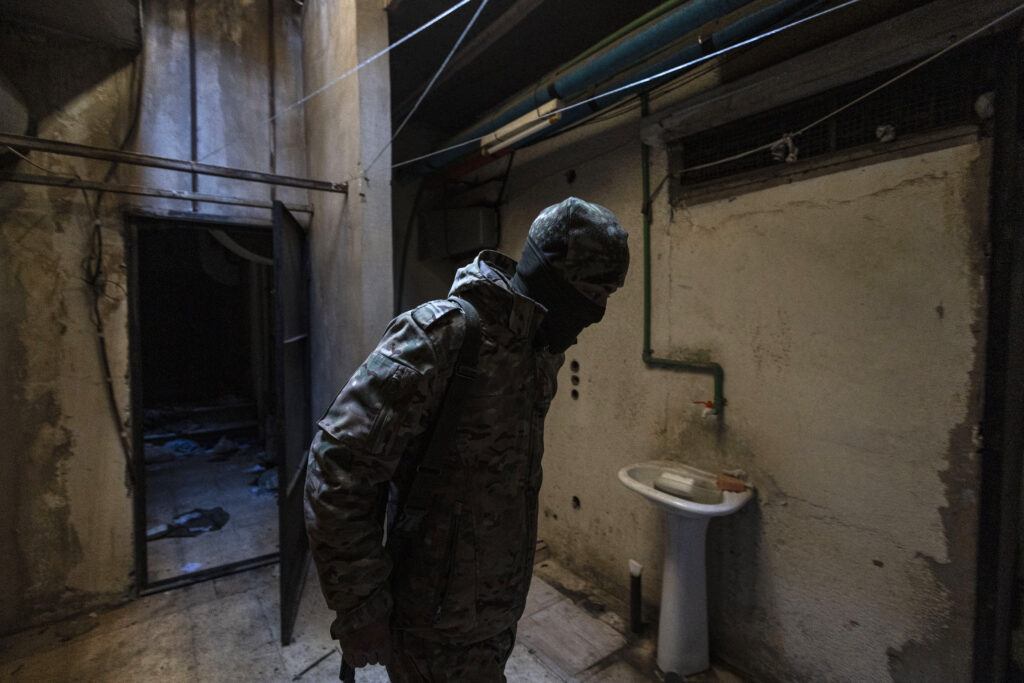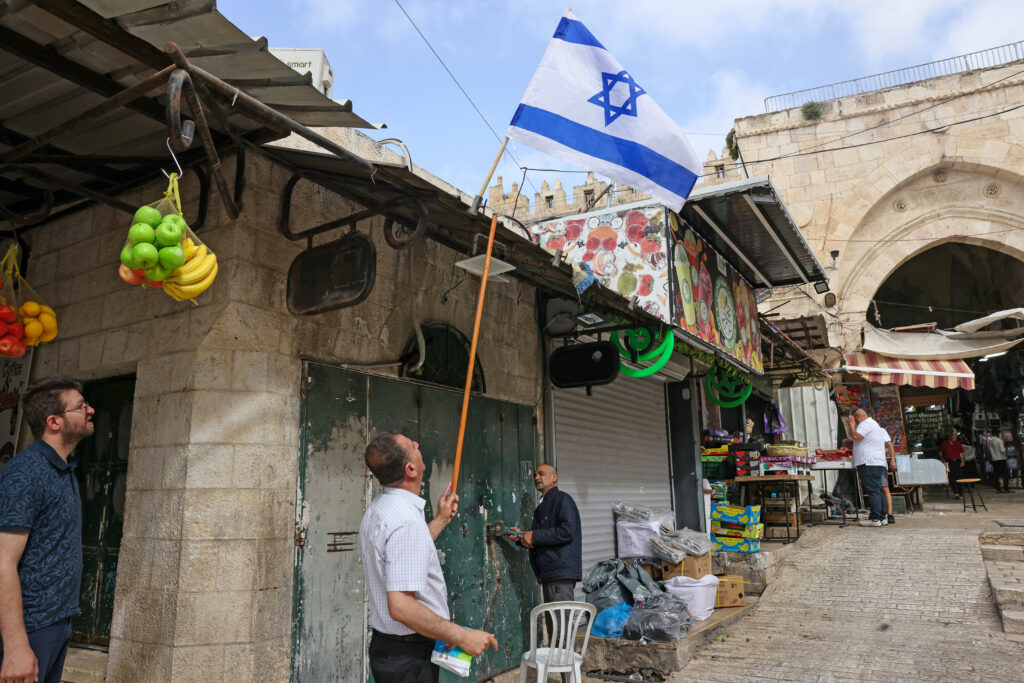AFP Asia Business
Germany arrests Syrian accused of crimes under Assad
An alleged former Syrian prison guard has been arrested in Germany on suspicion of committing crimes against humanity under former president Bashar al-Assad, prosecutors said Tuesday.The man, identified only as Fahad A., is accused of “acts of killing, torture and deprivation of liberty” while he worked in a Damascus facility run by Syrian intelligence in 2011 and 2012, during the Arab Spring protests.German authorities have pursued several suspects for crimes committed in Syria’s civil war under the principle of universal jurisdiction, even after Assad’s ouster last December.Prosecutors declined to give Fahad’s age or the year he came to Germany but said he was arrested in the town of Pirmasens in the western state of Rhineland-Palatinate.During his time at the Al-Khatib detention centre, also known as Branch 251, Fahad A. allegedly “took part in well over 100 interrogations where prisoners were subjected to severe physical abuse, for instance electrocution or beatings with cables”, they said.”Following his superiors’ orders, the suspect also harassed prisoners at night by, for example, hanging them from the ceiling, pouring cold water over them or forcing them to remain in uncomfortable positions,” prosecutors allege.At least 70 prisoners are thought to have died due to such abuse and the “catastrophic” prison conditions.The alleged offences occurred in the years of the bloody repression of anti-Assad protests during the Arab Spring.”The objective was to suppress the protest movement from early on and to intimidate the population,” prosecutors said.In 2022 former Syrian colonel Anwar Raslan was found guilty of overseeing the murders of 27 people and the torture of 4,000 others at the Al-Khatib centre in 2011 and 2012.That was the first international trial over state-sponsored torture in Syrian prisons and was hailed as “historic” by human rights activists.Europe’s biggest economy, then ruled by chancellor Angela Merkel, granted safe haven to hundreds of thousands of Syrians during the 2015-16 refugee influx.NGOs warned at the time of the danger that people accused of atrocities against civilians for Assad’s government were arriving incognito in Europe and obtaining asylum.An Islamist-led coalition toppled Assad in December after five decades of his family’s iron-fisted rule and nearly 14 years of brutal war that killed more than half a million people and displaced millions more.
SE Asian nations express ‘deep concern’ over US tariffs
Southeast Asian leaders expressed “deep concern” over US tariffs Tuesday, as they held a summit with China and Gulf states hailed as “a response to the call of the times” in a geopolitically uncertain world. The trade-dependent economies are looking to insulate themselves after US President Donald Trump blew up global trade norms by announcing a …
SE Asian nations express ‘deep concern’ over US tariffs Read More »
Palestinians clean up after Israeli nationalist march in Jerusalem
Palestinian traders in Jerusalem’s Old City returned to their shops on Tuesday to clean up a day after a march by Israeli nationalists that saw scuffles, insults and acts of vandalism.Some had to use crowbars, hammers and wirecutters to regain access to their own shops after many were vandalised during the Jerusalem Day march the day before.Jerusalem Day commemorates Israeli forces taking east Jerusalem during the 1967 Arab-Israeli war.On Tuesday, metal shutters protecting the shopfronts bore the marks of the parade’s passing, with padlocks blocked and stickers slapped upon them.”No humanitarian aid for Gaza,” read one sticker from Otzma Yehudit (Jewish Power).The far-right party headed by firebrand politician and National Security Minister Itamar Ben Gvir had a major presence in Monday’s march.Ben Gvir visited the Al-Aqsa mosque compound, known to Jews as the Temple Mount, during the Jerusalem Day events.Israel considers all of Jerusalem, including the annexed Palestinian-majority east, its indivisible capital.The international community does not recognise this, and Palestinians see east Jerusalem as the capital of a future state.On Tuesday, when employees of an east Jerusalem electricity supplier arrived at their office they discovered the front windows broken and the door blocked.- ‘Childish acts’ -A company official, Ismail Eshqart, came from headquarters to change the lock and assess the damage.He told AFP they had expected “a little more tension” than usual this year in the alley in the Muslim Quarter where Palestinians and a few Israeli residents, mostly religious Jews, mingle daily.He said there had been “deliberate acts of vandalism”, but he did not name the suspected perpetrators.”It’s the same story every year,” said clothes seller Abu Osama, referring to Jerusalem Day marchers.”They come and attack shops, make them close, and they break things, they throw firecrackers,” he told AFP as a municipal employee arrived with an electric saw to cut the padlock on the door of his sabotaged shop.”They do what they want and nobody says to them ‘what are you doing? That’s not allowed’!” Abu Osama added, angry at lost time over “childish acts” that made him open several hours late.Fruit sellers at stalls in front of the Damascus Gate into the Old City shared his dismay, but shrugged as they unloaded boxes of cherries and peaches.”The situation is worse and worse,” said grandmother Umm Mohammed who was born in the Old City and had come to do her shopping.- ‘It’s crazy!’ -“We want to live in peace — we are kind people,” she said, adding that she did not leave the house on Monday.Umm Mohammed said that last year, one man she knows “came out of his house and they hit him — and he is a big guy!”Armed with solvent and sponges, a group of around 10 Israeli and foreign volunteers arrived on Tuesday morning to help clean up in the march’s aftermath.”I came to do what I could, even if it’s not much,” said one volunteer who asked not to be identified.They scuttled between the shops, trying to avoid police patrols, but several were briefly stopped for allegedly disturbing the peace.Contacted by AFP, police did not respond to a request for comment.”It’s really upside down. It’s crazy,” said 24-year-old Joshua Korn of the Israeli-Palestinian activist group Standing Together.”It’s crazy because these people who are here to protect us… they shout at us that we’re provoking… just because we’re here to remove racist graffiti and stickers that have been put up by settlers in an act of provocation!” Korn said of the police.
Brunei sultan in KL hospital for ‘fatigue’
Brunei’s Sultan Hassanal Bolkiah was admitted to a hospital in Kuala Lumpur on Tuesday due to fatigue, though his office insisted the world’s longest-serving monarch was in “good health”. The sultan is in Kuala Lumpur with other Association of Southeast Asian Nations (ASEAN) leaders, who on Tuesday met with Chinese Premier Li Qiang and dignitaries from the Gulf Cooperation Council (GCC).A Malaysian government source told AFP the sultan “was hospitalised in between the ASEAN-GCC and ASEAN-GCC-China summit” for fatigue.A statement from the Brunei prime minister’s office — a position held by the sultan — said he was in “good health”.”He has been feeling tired and on the advice of the host’s health experts, has decided to rest for a few days at the National Heart Institute,” it said.Asked earlier at a news conference whether the sultan had been hospitalised, Malaysian Prime Minister Anwar Ibrahim said: “Well he’s feeling a bit tired, so he’s resting at the (National Heart Institute).”The hospital is the designated one for VIPs during the ASEAN summit, AFP’s source said.The National Heart Institute said it could not comment.- Busy schedule -The 78-year-old sultan touched down in Kuala Lumpur on Sunday, according to footage from Malaysia’s national news agency.He was the last leader to arrive at the Kuala Lumpur Convention Centre (KLCC) on Monday morning for the 46th ASEAN summit, but appeared in good spirits, smiling and stopping for a prolonged chat before heading into the venue with Anwar.The busy schedule saw the leaders address US tariffs, the Myanmar conflict, and East Timor’s application to join the bloc among other topics.After a quick costume change into matching traditional batik shirts, the leaders returned to the KLCC for a lavish gala dinner, joined by Premier Li and dignitaries from the GCC — a regional bloc made up of Bahrain, Kuwait, Oman, Qatar, Saudi Arabia and the United Arab Emirates.Tuesday saw ASEAN meet first with the GCC in the morning, before the two blocs were joined by China at 3pm local time (0700 GMT).Footage taken by AFP around midday showed the sultan walking briskly but looking weary, surrounded by his entourage.Sultan Hassanal ascended the throne in 1967.He is one of the richest people on the planet, and comes from a family that has ruled Brunei, a small Muslim nation perched on the north of the tropical island of Borneo, for more than 600 years.His decades ruling Brunei have seen the country gain full independence from Britain and living standards soar to among the highest globally.But his reign has also been marked by controversies including the introduction of tough Islamic laws legislating penalties such as severing of limbs and death by stoning.




